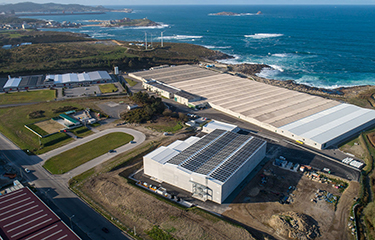Stolt Sea Farm is planning to expand the flatfish hatchery at its land-based recirculating aquaculture facility in Cervo, Spain to increase its production of turbot and sole.
In a press release, the company announced the government of Galicia, Spain, gave it the final green light it needed to build an extension on its hatchery. The company already received a construction license and a favorable environmental impact report, it said.
“This is a very important landmark for us,” Stolt Sea Farm President Jordi Trias said. “This exciting project demonstrates the confidence we have in the strength of our business and is crucial to our strategic growth plan, which includes reaching our annual production target of 23,000 tons of turbot and sole by 2035.”
The new facility, the company said, is already the world’s largest hatchery for flatfish and the expansion will allow it to grow even further to a capacity of six million turbot juveniles and 10 million sole juveniles annually. The increased hatchery capacity, it said, will, in turn, increase its production capacity to 8,500 metric tons of turbot and more than 3,000 metric tons of sole.
“Our Cervo expansion also underlines our commitment to creating opportunities for our employees and people in the local community,” Trias said. “Ultimately, the new hatchery will support increased sales and the continued growth and success of our business, so that future generations continue to enjoy wonderful seafood.”
The company said it plans to start construction in October, and expects the facility to be operational by “mid-2025.”
The announcement comes just under a month after Stolt Sea Farm’s parent company, Stolt-Nielsen Limited, reported its unaudited Q2 results for the period ending 31 May, 2023. The aquaculture company reported an operating profit before the fair value adjustment of biomass of USD 4.4 million (EUR 4 million), down from the USD 5.6 million (EUR 5.1 million) it posted in Q1 2023.
The company said in a release that the drop was related to higher electricity and feed costs, along with administrative and general expenses.
The company posted revenues of USD 27.6 million (EUR 25 million) in Q2 2023, up from the USD 25.1 million (EUR 22.8 million) it posted in Q1 2023 and from the USD 26.1 million (EUR 23.7 million) it posted in the same period last year. Excluding fair-value adjustments, the company posted a Q2 2023 gross profit of USD 7.2 million (EUR 6.5 million), down from USD 7.5 million (EUR 6.8 million) in Q1 2023.
Gross profit with the fair-value adjustment, however, represented a loss of USD 2.9 million (EUR 2.6 million) in Q2 2023, compared to a profit of USD 3.7 million (EUR 3.3 million) in Q2 2022.
For the first half of the year ending 31 May, the Stolt Sea Farm had revenue of USD 52.7 million (EUR 48 million), down from the USD 56.1 million (EUR 51.1 million) it posted in H1 2022. Operating profit for H1 2023 reached USD 4.7 million (EUR 4.2 million), down from the USD 14.2 million (EUR 12.9 million) it posted in H1 2022.
Looking forward, Stolt-Nielsen CEO Niels G. Stolt-Nielsen said the company is expecting an increase in sales.
"With the advent of summer, Stolt Sea Farm is experiencing a pick-up in demand in the hospitality sector, buoyed by a seemingly strong start to the tourist season in southern Europe,” he said. “With strong production growth at our turbot and sole farms, we continue our focus on expanding our sales channels and geographical reach to support sales growth and price improvements.”
Photo courtesy of Stolt Sea Farm







